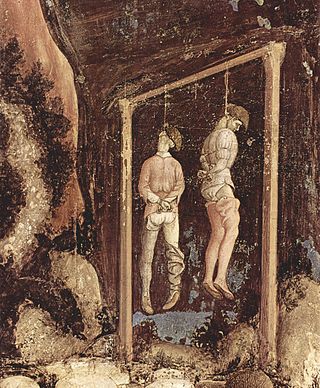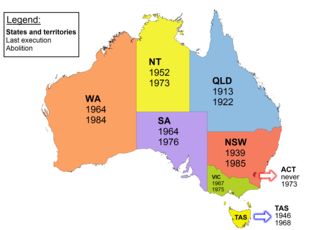Michael Manning | |
|---|---|
| Born | 1 September 1928 Limerick, Ireland |
| Died | 20 April 1954 (aged 25) Mountjoy Prison, Dublin, Ireland |
| Cause of death | Execution by hanging |
| Conviction(s) | Rape Murder |
| Criminal penalty | Death |
| Details | |
| Victims | Catherine Cooper |
| Date | 18 November 1953 |
| Country | Ireland |
Date apprehended | 19 November 1953 |
Michael Manning (1 September 1928 - 20 April 1954) was an Irish man who was convicted for rape and murder and executed in 1954. He was the 29th and last person to be executed in the Republic of Ireland, as capital punishment was gradually abolished in the decades following Manning's execution.
Manning, a 25-year-old carter from Johnsgate in Limerick, was found guilty in February 1954 of the rape and murder of Catherine Cooper, a 65-year-old nurse who worked at Barringtons' Hospital in the city. [1] Nurse Cooper's body was discovered on 18 November 1953 in the quarry under the New Castle, Dublin Road, Castletroy, where she was found to have choked on grass stuffed into her mouth to keep her from screaming during the commission of the crime. [2]
Manning expressed remorse for the crime, which he did not deny. By his own account, he was making his way home on foot after a day’s drinking in The Black Swan, Annacotty when he saw a woman he did not recognise, walking alone. "I suddenly lost my head and jumped on the woman and remember no more until the lights of a car shone on me." He took flight at this point but was arrested within hours, after his distinctive hat was found at the scene of the crime. [3]
Although Manning made an impassioned plea for clemency in a letter [4] to the Minister for Justice Gerald Boland, his request was denied, although it was supported by Nurse Cooper's family. The execution by hanging was duly carried out on 20 April 1954 in Mountjoy Prison, Dublin by Albert Pierrepoint, who had travelled from Britain where he was one of three Senior Executioners.
Frank Prendergast, subsequently TD for Limerick East who knew Manning well, recalled later: "Friends of mine who worked with me, I was serving my time at the time, went up to visit him on the Sunday before he was hanged. And they went to Mass and Holy Communion together and they played a game of handball that day. He couldn't have been more normal." [5]
Manning left a wife who was pregnant at the time of the murder. His body was buried in an unmarked grave in a yard at Mountjoy Prison.
The death penalty was abolished in 1964 for all but the murder of Gardaí, diplomats and prison officers. It was abolished by statute for these remaining offences in 1990 and was finally expunged from the Constitution of Ireland by a referendum in 2001.
Capital punishment, also known as the death penalty and formerly called judicial homicide, is the state-sanctioned killing of a person as punishment for actual or supposed misconduct. The sentence ordering that an offender be punished in such a manner is known as a death sentence, and the act of carrying out the sentence is known as an execution. A prisoner who has been sentenced to death and awaits execution is condemned and is commonly referred to as being "on death row". Etymologically, the term capital refers to execution by beheading, but executions are carried out by many methods, including hanging, shooting, lethal injection, stoning, electrocution, and gassing.

Hanging is killing a person by suspending them from the neck with a noose or ligature. Hanging has been a common method of capital punishment since the Middle Ages, and is the primary execution method in numerous countries and regions. The first known account of execution by hanging is in Homer's Odyssey. Hanging is also a method of suicide.

Capital punishment in the United Kingdom predates the formation of the UK, having been used within the British Isles from ancient times until the second half of the 20th century. The last executions in the United Kingdom were by hanging, and took place in 1964; capital punishment for murder was suspended in 1965 and finally abolished in 1969. Although unused, the death penalty remained a legally defined punishment for certain offences such as treason until it was completely abolished in 1998; the last execution for treason took place in 1946. In 2004, Protocol No. 13 to the European Convention on Human Rights became binding on the United Kingdom; it prohibits the restoration of the death penalty as long as the UK is a party to the convention.

In the United States, capital punishment is a legal penalty in 27 states, throughout the country at the federal level, and in American Samoa. It is also a legal penalty for some military offenses. Capital punishment has been abolished in 23 states and in the federal capital, Washington, D.C. It is usually applied for only the most serious crimes, such as aggravated murder. Although it is a legal penalty in 27 states, 19 of them have authority to execute death sentences, with the other 8, as well as the federal government and military, subject to moratoriums.
Capital punishment is a legal penalty in the U.S. state of Utah.

Capital punishment – the process of sentencing convicted offenders to death for the most serious crimes and carrying out that sentence, as ordered by a legal system – first appeared in New Zealand in a codified form when New Zealand became a British colony in 1840. It was first carried out with a public hanging in Victoria Street, Auckland in 1842, while the last execution occurred in 1957 at Mount Eden Prison, also in Auckland. In total, 85 people have been lawfully executed in New Zealand.

Mountjoy Prison, founded as Mountjoy Gaol and nicknamed The Joy, is a medium security men's prison located in Phibsborough in the centre of Dublin, Ireland. The current prison Governor is Ray Murtagh.
Capital punishment was abolished in Virginia on March 24, 2021, when Governor Ralph Northam signed a bill into law. The law took effect on July 1, 2021. Virginia is the 23rd state to abolish the death penalty, and the first southern state in United States history to do so.
Capital punishment is a legal penalty in Sri Lanka.

Jesse Joseph Tafero was convicted of murder and executed via electric chair in the U.S. state of Florida for the murders of 39-year-old Florida Highway Patrol officer Phillip A. Black and 39-year-old Ontario Provincial Police Corporal Donald Irwin, a visiting Canadian constable and friend of Black. The officers were killed during a traffic stop where Tafero, his wife Sunny Jacobs and their children were passengers. Tafero's execution was botched; his head burst into flames during the execution by electric chair. After Tafero's execution, the driver, Walter Rhodes, confessed to shooting the officers, but later retracted his testimony.
Capital punishment is a legal penalty in Iran. The list of crimes punishable by death includes murder; rape; child molestation; homosexuality; drug trafficking; armed robbery; kidnapping; terrorism; burglary; incest; fornication; adultery; sodomy; sexual misconduct; prostitution; plotting to overthrow the Islamic government; political dissidence; sabotage; arson; rebellion; apostasy; blasphemy; extortion; counterfeiting; smuggling; recidivist consumption of alcohol; producing or preparing food, drink, cosmetics, or sanitary items that lead to death when consumed or used; producing and publishing pornography; using pornographic materials to solicit sex; capital perjury; recidivist theft; certain military offences ; "waging war against God"; "spreading corruption on Earth"; espionage; and treason. Iran carried out at least 977 executions in 2015, at least 567 executions in 2016, and at least 507 executions in 2017. In 2018 there were at least 249 executions, at least 273 in 2019, at least 246 in 2020, at least 290 in 2021, at least 553 in 2022, at least 834 in 2023, and at least 226 so far in 2024. In 2023, Iran was responsible for 74% of all recorded executions in the world.
Albert Pierrepoint (1905–1992) was the most prolific British hangman of the twentieth century, executing 434 men and women between 1932 and 1955. This table records the locations of each of the executions he participated in, the numbers in brackets being the number of executions he was assistant executioner at, the other numbers are those in which he officiated as chief executioner.
Capital punishment in the Philippines specifically, the death penalty, as a form of state-sponsored repression, was introduced and widely practiced by the Spanish government in the Philippines. A substantial number of Filipino national martyrs like Mariano Gómez, José Burgos, and Jacinto Zamora, Thirteen Martyrs of Cavite, Thirteen Martyrs of Bagumbayan, Fifteen Martyrs of Bicol, Nineteen Martyrs of Aklan and Jose Rizal were executed by the Spanish government.

Capital punishment in Australia has been abolished in all jurisdictions since 1985. Queensland abolished the death penalty in 1922. Tasmania did the same in 1968. The Commonwealth abolished the death penalty in 1973, with application also in the Australian Capital Territory and the Northern Territory. Victoria did so in 1975, South Australia in 1976, and Western Australia in 1984. New South Wales abolished the death penalty for murder in 1955, and for all crimes in 1985. In 2010, the Commonwealth Parliament passed legislation prohibiting the re-establishment of capital punishment by any state or territory. Australian law prohibits the extradition or deportation of a prisoner to another jurisdiction if they could be sentenced to death for any crime.
Capital punishment is a legal penalty in Malaysian law.

Capital punishment in the Republic of Ireland was abolished in statute law in 1990, having been abolished in 1964 for most offences including ordinary murder. The last person to be executed was Michael Manning, hanged for murder in 1954. All subsequent death sentences in the Republic of Ireland, the last handed down in 1985, were commuted by the President, on the advice of the Government, to terms of imprisonment of up to 40 years. The Twenty-first Amendment to the constitution, passed by referendum in 2001, prohibits the reintroduction of the death penalty, even during a state of emergency or war. Capital punishment is also forbidden by several human rights treaties to which the state is a party.
Capital punishment was abolished in Turkey in 2004, and no prisoners have been executed since October 1984. Before that, over 500 convicts sentenced to death were executed. The method of execution was hanging.

Capital punishment was outlawed in the State of New York after the New York Court of Appeals declared it was not allowed under the state's constitution in 2004. However certain crimes occurring in the state that fall under the jurisdiction of the federal government are subject to the federal death penalty.
Capital punishment in Hawaii ended in 1957 when it was still an organized incorporated territory of the United States. About 75 people were executed by the government, all for the crime of murder, and all by hanging. Additionally, during and after World War II, at least seven U.S. servicemen were executed by the United States Armed Forces by order of a general court martial.
Capital punishment is not a legal penalty in Samoa. The death penalty was used in the colonial era, but the practice had ceased by the time of independence in 1962, with death sentences being commuted to life imprisonment, and it was formally abolished in 2004. The last execution was carried out in 1952.